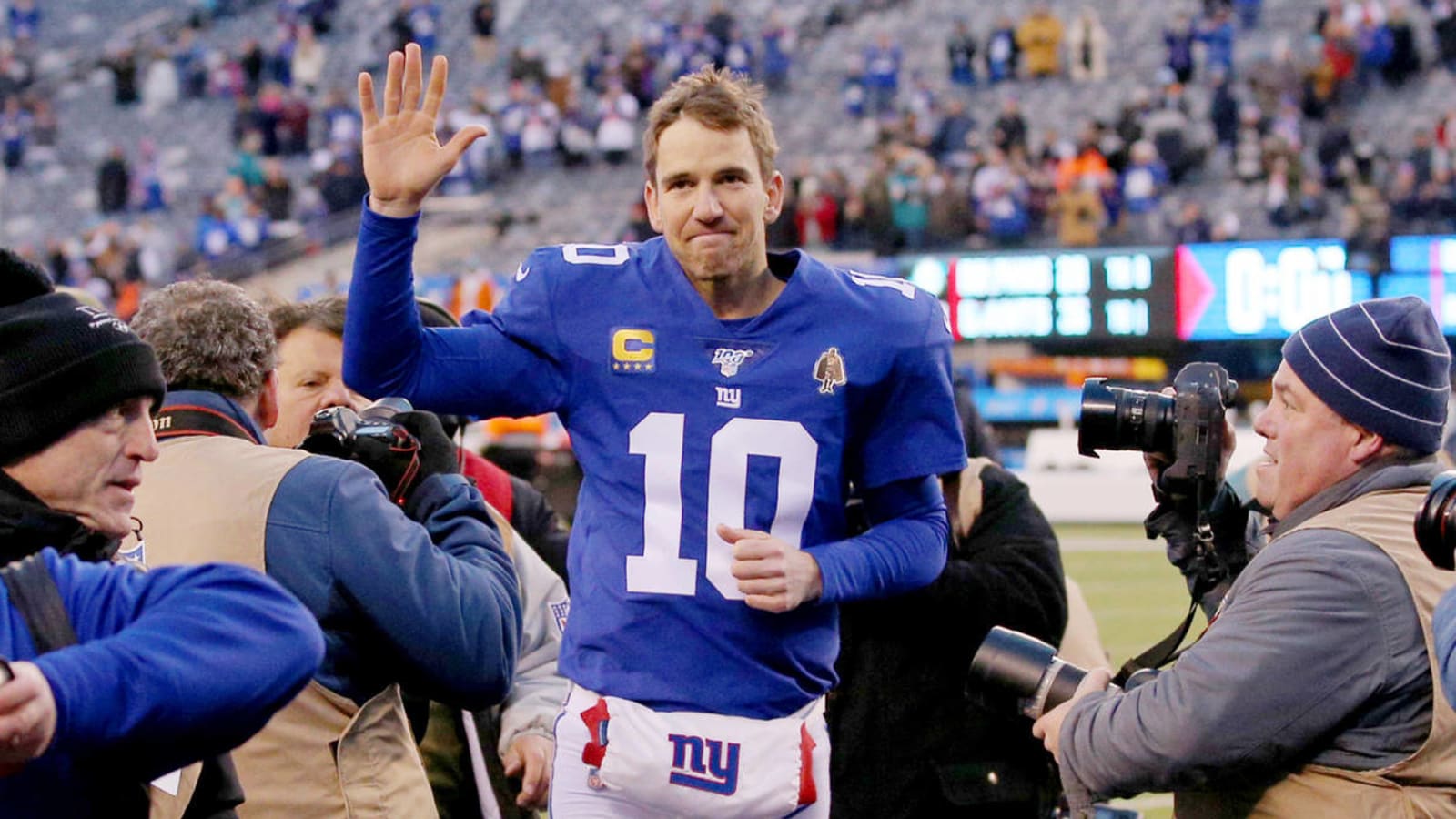
So long, Eli Manning. Your next stop is Hall of Fame.
Eli Manning’s Hall of Fame debate will be one of the more complicated in pro football history.
Responsible for two of the greatest quarterback runs in playoff history, Manning -- who Wednesday announced his retirement -- ranks seventh all time in touchdown passes (366) and passing yards (57,023). From 2004-17, he started 210 straight games, the third-best QB streak of all time.
But Manning, replaced by rookie Daniel Jones as Giants starter in 2019, trails 2004 classmates Ben Roethlisberger and Philip Rivers in accolades (four Pro Bowls to Big Ben’s six and Rivers’ eight). A strong argument also can be made that Manning was never considered a top-five quarterback during his career. And, of course, his last four seasons were, ah, sub-optimal.
That said, an Eli Manning bust will appear in the Pro Football Hall of Fame in Canton, Ohio. His performance during the 2007 and 2011 playoffs should seal his HOF case with voters.
We cannot live in an era when fans are flooded with shallow-dive “Tom Brady, six rings, GOAT” proclamations while Manning's postseason success is treated as secondary to his lesser regular-season work. Brady does not quite boast the regular-season numbers of Drew Brees, Peyton Manning and, from an efficiency standpoint, Aaron Rodgers. His first three championships came when he was not yet a perennial Pro Bowler, but more the New England defense's copilot. These topics are glossed over because of the Patriots' playoff dominance.
It would then stand to reason the player most responsible for twice derailing Brady at his peak, in two of this century’s biggest games, should be appropriately credited for his high-end postseasons. (Note: Brady vs. the younger Manning is obviously not a debate; this is merely a perception point.)
Manning didn't just toss in two Super Bowl flukes. Considering his underdog teams and quality of opposition, Manning conquered postseason gauntlets unlike those of almost any other championship-winning quarterback. He led the Giants to road victories over four NFC Nos. 1 or 2 seeds.
In addition to ruining the 2007 Patriots' "greatest team ever" coronation in Super Bowl XLII, Manning ended Brett Favre’s Packers career by throwing for 251 yards and no interceptions in that season's NFC title game -- the fifth-coldest game in NFL history. Four seasons later, he ended Rodgers’ first MVP season, passing for 330 yards and three touchdown passes in a divisional-round romp over 15-1 Green Bay. In the NFC Championship Game a week later, he threw for 316 yards and two TDs to beat the 49ers and their No. 2-ranked defense.
Manning’s 296 yards passing in a 21-17 Super Bowl XLVI win against New England gave him the most (1,219) in one playoffs. The two-time Super Bowl MVP's 87.4 playoff passer rating betters Roethlisberger's and Rivers'. These are not all-encompassing measurement tools, with Mark Sanchez's playoff rating (94.3) sitting higher than many Hall of Famers', but Manning did not have as much help as you might think.
Praise endures for those Giants defenses, but they were not statistically imposing. Their 2007 unit ranked 17th in points allowed, the ’11 Giants 25th. Modern Super Bowl defenses usually afford quarterbacks more security. All six Brady-led champions had top-eight scoring defenses; both of Roethlisberger’s titles featured a superior margin for error, via top-three defenses. Since 2000, only four Super Bowl winners lacked a top-12 scoring defense -– the 2006 Colts and ’09 Saints were the others.
This path is obviously more difficult, and Manning’s Giants did it twice. Their regression on defense, and on nearly every other front since Super Bowl XLVI, helps explain how we got here with Manning.
Exiting 2011, the Giants looked well-stocked offensively. Hakeem Nicks posted the second-most receiving yards in a single playoffs (444), and Victor Cruz was a consistent threat for salsa escapades. Injuries doomed Nicks soon after, leading to retirement at 27. In 2014, Cruz suffered a knee injury that led to an early career conclusion. The Giants' failure to find a consistent tight end after Jeremy Shockey didn’t help. This aerial misfortune came after Plaxico Burress’ self-inflicted gunshot wound weakened 2008's No. 1-seeded team. Third in DVOA, the ’08 Giants were much better than the ’07 champs.
Twice between 2013-17, the Giants' leading rusher failed to exceed 600 yards. No Giant rushing attack in that span finished higher than 18th. As the team’s Super Bowl-era offensive line aged, effective successors proved elusive. From 2011-18, Pro Football Focus graded just one Giants line as a top-20 group. For an immobile quarterback without ground support, that posed a bit of a problem.
During the years an aging Manning needed more help, the Giants’ front office failed him. As most of his age-group peers found themselves in better late-career situations, their superior production has affected the perception of Manning.
But the 39-year-old passer supplied the longevity, clutch consistency and hardware to compensate for a wasted back nine of his career. This is not Jim Plunkett or Joe Flacco (zero combined Pro Bowls, with the latter’s best touchdown pass season matching Manning’s fifth best). Manning is well above that level.
As the 2010s progressed, the Giants and Manning made this HOF argument more difficult. But the parties' collective swoon has not done enough to detract from what he accomplished. There will be several quarterbacks from this golden age who will earn Hall of Fame busts. Manning belongs in Canton, too.
Editor's note: This column, originally published in July 2019, has been updated.
More must-reads:
- Eli Manning to retire after 16-year Giants career
- NFL world reacts to Eli Manning's retirement; Hall of Fame debate starts
- The 'NFL Comeback Player of the Year' winners
Breaking News
Customize Your Newsletter
 +
+
Get the latest news and rumors, customized to your favorite sports and teams. Emailed daily. Always free!

